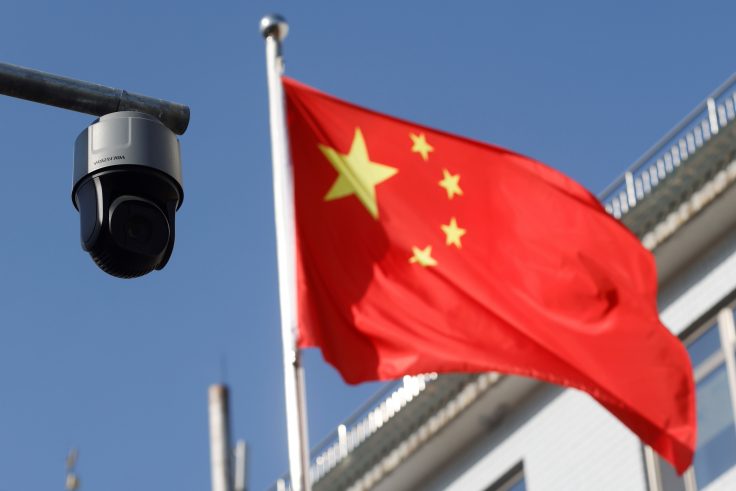A Chinese state-owned surveillance giant that provides equipment used in the communist nation's mass surveillance and detainment of Uyghur Muslims is joining a United Nations "sustainability initiative" aimed at fighting climate change and countering "human rights abuses."
Hikvision, which sits on a U.S. trade blacklist over its complicity in the Chinese government's ongoing genocide in Xinjiang, is now a member of the United Nations Global Compact, the company announced in a Tuesday statement. Launched in 2000, the compact consists of thousands of companies from across the world that pledge to "support U.N. goals" and implement "universal sustainability principles" related to "human rights, labor, the environment, and anti-corruption." Hikvision said its inclusion in the compact reflects the company's "continuous efforts to put into practice our understanding of 'Tech for Good.'" By joining the compact, meanwhile, Hikvision pledged to "make sure" it is "not complicit in human rights abuses."
Hikvision's work in its native China, however, tells a different story.
The company's cameras are a crucial part of the Chinese Communist Party's surveillance system used to track and detain Uyghurs in Xinjiang. Hikvision—which reports to the Chinese government through its largest shareholder, the state-owned China Electronics Technology Group—entered into government contracts in Xinjiang that contained language referring to the surveillance of "Uyghurs" and "mosques." Its technology has been used to help detain Uyghurs flagged for traveling abroad, and its cameras are included in the CCP's mass detention facilities located in Xinjiang. In 2019, Hikvision marketed a camera that can automatically identify Uyghurs.
The revelation reflects China's growing grip on the United Nations, with the communist nation working in recent years to put its officials in leadership positions and gain a seat on the organization's influential human rights council panel. Hikvision's inclusion in the U.N. Global Compact could also create problems for the Biden administration, which has proposed to collaborate with the compact to vet federal contractors.
In May 2021, President Joe Biden issued an executive order calling on his Department of Defense, General Services Administration, and National Aeronautics and Space Administration to require major federal contractors to disclose their carbon emissions and set "science-based reduction targets."
Roughly one year later, in November 2022, the agencies proposed a rule that would require companies receiving more than $50 million in federal contracts to set emissions reductions targets, which would then be vetted and approved by the Science Based Targets initiative (SBTi), a London-based entity that helps companies set climate-related goals. The U.N. Global Compact cofounded SBTi in 2015 and helps run it today.
Republican lawmakers took issue with the proposal—which the Biden administration is yet to finalize—during a December hearing, arguing that the federal government would not be able to provide adequate oversight into SBTi. The initiative's links to Hikvision and other blacklisted Chinese companies through the U.N. Global Compact will likely increase those concerns.
In addition to Hikvision, the U.N. Global Compact counts Dahua Technology as a member. Dahua, like Hikvision, is a Chinese video surveillance company that is owned in part by the Chinese government. The company has advertised facial recognition technology that sends its user a warning when it identifies a Uyghur and provides equipment to Xinjiang authorities. The Federal Communications Commission banned both Hikvision and Dahua from selling products in the United States in 2022.
The U.N. Global Compact quietly added Hikvision to its member list within the past two weeks, internet archives show. The compact's website touts Hikvision as an "electronic & electrical equipment" company that joined on Jan. 29. Hikvision will submit an update on its "sustainability" progress next July, and in a "letter of commitment" the company sent to the United Nations, Hikvision pledged to follow the compact's "Ten Principles ... on human rights, labor, environment, and anti-corruption." Those principles call on compact members to "make sure they are not complicit in human rights abuses" and "support and respect the protection of internationally proclaimed human rights."
The U.N. Global Compact, which did not respond to a request for comment, is headquartered in New York City and run by Sanda Ojiambo, a Kenyan national who holds a master's degree from the University of Minnesota. Left-wing philanthropic networks in the United States have a long history of working with the compact—the Rockefeller Foundation, for example, partnered with the compact in 2012 to provide companies with climate-related "sustainable development goals." The foundation also provides funding for SBTi, as does Bloomberg Philanthropies and the Bezos Earth Fund.
Neither Hikvision nor the Biden administration responded to requests for comment.
